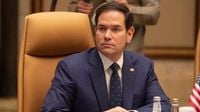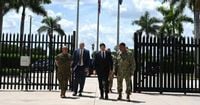Secretary of State Marco Rubio is stepping into the global spotlight once again, announcing a whirlwind diplomatic mission to Latin America even as he reshapes America’s foreign aid apparatus back home. On August 29, 2025, Rubio revealed that he will travel to Mexico and Ecuador from September 2 to 4, aiming to tackle a slate of urgent issues: migration, drug cartels, the fentanyl crisis, and the growing influence of China across the Global South, according to Border Report and China Global South.
The timing of Rubio’s journey is no accident. Just days before his departure, he made headlines by delegating the close-out of the U.S. Agency for International Development (USAID) to Russell Vought, Director of the Office of Management and Budget. This move, announced on social media, is part of a broader effort to consolidate U.S. foreign operations and cut costs. "I joked with @POTUS that I had four jobs. He told me to give one to my friend @RussVought47. So I did," Rubio quipped on August 29, referencing President Trump’s suggestion that he lighten his load. With core USAID programs already shifted to the State Department, Vought now oversees the agency’s final wind-down phase, a transition that Rubio claims has already saved taxpayers "tens of billions of dollars."
This bureaucratic shuffle comes as the Trump administration intensifies its scrutiny of foreign aid and development programs. Earlier this year, Rubio oversaw the elimination of roughly 83 percent of USAID’s initiatives, slashing efforts that had long supported vulnerable communities across Africa, Asia, and Latin America. In a further blow to international assistance, President Trump invoked a rare "pocket rescission" to block $4.9 billion in foreign aid previously approved by Congress, a move that has drawn bipartisan criticism for sidestepping legislative control.
Against this backdrop, Rubio’s diplomatic tour is freighted with high expectations and even higher stakes. In Mexico, he is set to discuss a major binational security deal with President Claudia Sheinbaum. The U.S. agenda is clear: "advance key U.S. priorities (including) swift and decisive actions to dismantle cartels, halt fentanyl trafficking, (and) end illegal immigration," Rubio’s office stated. This marks his fourth official trip to the region as Secretary of State—a testament to the administration's focus on Latin America as both a security challenge and a geopolitical battleground.
Yet, the path to closer cooperation is anything but smooth. President Sheinbaum, in a news conference broadcast on social media, made it clear that Mexico will not permit U.S. troops on its soil as part of the new security framework. "They offered more intervention in our country, and we said no," Sheinbaum explained. "We will never sign something that from our perspective violates our sovereignty or our territory. Never. They might have the intent to do it, but we said no, not under that scheme." This firm stance comes despite President Trump’s repeated offers to send U.S. forces to help dismantle the powerful cartels that have fueled both violence in Mexico and a deadly drug epidemic in the United States.
The scale of the crisis is staggering. According to Border Report, Mexico suffered more than 30,000 violent homicides last year, most linked to organized crime. Meanwhile, fentanyl and other illicit drugs continue to flood American communities, stoking public anxiety and political pressure for tougher action. While Sheinbaum has rejected the idea of U.S. boots on the ground, she has allowed for increased cooperation in other forms—such as the use of U.S. spy drones off the Pacific Coast near Sinaloa cartel strongholds and the training of Mexican marine infantry special operations groups by American Green Berets.
Rubio’s agenda in Ecuador is equally ambitious. The U.S. is pressing Ecuador and other nations to distance themselves from China’s Belt and Road Initiative, which Washington characterizes as "predatory." The Trump administration argues that closer alignment with the United States is essential to counter China’s growing sway over infrastructure, trade, and security in the hemisphere. According to Latin Times, strengthening ideological alignment and security cooperation are key pillars of Rubio’s mission.
Security concerns in the region have been heightened by recent U.S. military maneuvers. Just before Rubio’s meeting with the Southern Command (SOUTHCOM) at its headquarters in Doral, Florida, the United States deployed eight warships—including destroyers, a cruiser, an amphibious ship with 2,500 marines, and specialized drug interdiction agents—to the Caribbean and Pacific. Officially, these moves are part of an "enhanced anti-narcotics operation." However, the timing and scale have been widely interpreted as a direct warning to Venezuelan President Nicolás Maduro, whose regime the Trump administration does not recognize as legitimate.
The White House, through Press Secretary Karoline Leavitt, has intensified its rhetoric, labeling Maduro a "fugitive head of narcoterrorism" and accusing him of leading the "Cártel de los Soles," a criminal organization involved in drug trafficking. In response, Maduro has ordered the deployment of 15,000 soldiers to Venezuela’s border with Colombia and called on militias to be "ready to defend national territory" against what he describes as a foreign intervention plot. The Pentagon, for its part, insists that U.S. ships "are not near the Venezuelan coast," though their presence has nonetheless stoked fears of a potential confrontation.
Despite the saber-rattling, U.S. diplomats have been at pains to clarify that Washington "is not seeking a U.S.-led regime change" in Venezuela. The focus, they say, remains on curbing drug trafficking, supporting regional stability, and countering the influence of foreign powers—chief among them China.
Rubio’s approach weaves together military pressure, diplomatic outreach, and a dramatic reconfiguration of America’s foreign aid footprint. By placing USAID’s closure in the hands of a trusted ally and slashing development programs, he is signaling a new era of hard-nosed, cost-conscious diplomacy. At the same time, his Latin American tour underscores the administration’s determination to forge stronger security partnerships, even as it navigates the delicate politics of sovereignty and intervention.
As the Secretary of State prepares for his fourth trip to Latin America, the region finds itself at a crossroads—caught between the competing pulls of American and Chinese influence, beset by violence and drug trafficking, and wary of foreign entanglements. Whether Rubio’s high-stakes gambit will deliver real progress or deepen existing divisions remains to be seen. What’s certain is that the choices made in the coming days will reverberate far beyond the meeting rooms of Mexico City and Quito, shaping the future of U.S.-Latin American relations for years to come.


